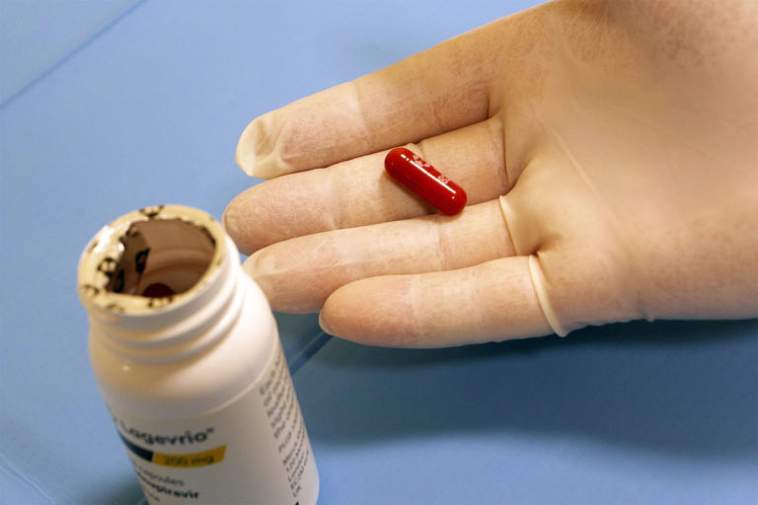(MSN) (Bloomberg) — Merck & Co.’s Covid-19 pill is giving rise to new mutations of the virus in some patients, according to a study that underscores the risk of trying to intentionally alter the pathogen’s genetic code.
Some researchers worry the drug may create more contagious or health-threatening variations of Covid, which has killed more than 6.8 million people globally over the past three years.
Mutations linked to the use of Merck’s pill, Lagevrio, have been identified in viral samples taken from dozens of patients, according to a preprint study from researchers in the US and at the Francis Crick Institute, Imperial College London and other UK institutions.
The drug-linked mutations of the virus haven’t been shown to be more immune-evasive or lethal yet, according to the study published Friday without peer review on the medRxiv website. But their very existence highlights what some scientists say are potential risks in wider use of the drug, which was recently cleared in China.
Lagevrio works by creating mutations in the Covid genome that prevent the virus from replicating in the body, reducing the chances it will cause severe illness. Some scientists had warned before it was authorized in late 2021 that by virtue of how it works, the drug could give rise to mutations that could turn out to be problematic. The preprint paper has reawakened those worries about the Merck drug.
“There’s always been this underlying concern that it could contribute to a problem generating new variants,” said Jonathan Li, a virologist at Harvard Medical School and Brigham and Women’s Hospital in Boston. “This has largely been hypothetical, but this preprint validates a lot of those concerns.”
Merck Response
Merck disputes the view that its drug is causing problematic variants.
“There is no evidence to indicate that any antiviral agent has contributed to the emergence of circulating variants,” Merck spokesman Robert Josephson said in an email in response to questions about the study. “Based on available data we do not believe that Lagevrio (molnupiravir) is likely to contribute to the development of new meaningful coronavirus variants.”
He said new mutations have emerged over the course of the pandemic due to the virus spreading uncontrollably and Lagevrio can form an important part of the solution, he said. Merck pointed to research done in animals that showed its drug didn’t cause mutations.
The study authors assume the mutations were associated with molnupiravir treatment, but don’t have direct proof that the mutations arose in patients who took their drug, Josephson said in a follow-up email. Instead, the researchers drew their conclusions from “circumstantial associations between viral sequence origin and timeframe of sequence collection in countries where molnupiravir is available,” Josephson said.
Merck fell as much as 1.2% in New York Wednesday, recovering some losses to close down 0.4%.
The US Food and Drug Administration, which authorized Lagevrio in late 2021, said it doesn’t comment on third-party research and works with Covid drugmakers to assess their products’ activity against variants.
Preprint
Major scientific journals don’t publish studies until the completion of a “peer review” process in which the research is scrutinized by outside experts. During the pandemic, scientists increasingly started publishing their research on what are known as “preprint servers” prior to exhaustive reviews, in attempt to advance the science more quickly and share urgent findings.
Researchers found Lagevrio-induced mutations in small patient clusters, indicating the new versions were spreading among them. While the biggest group they found with similar mutations was 21 people, that may not fully represent the true scope of the problem as viral samples of many patients aren’t analyzed, according to Ryan Hisner, an independent researcher from Indiana who helped write the paper.
The researchers looked at some 13 million viral genomes in databases around the world. The drug-linked mutations were proportionally more common in countries and groups where Lagevrio was likely to be used, especially the US and Australia, where it was introduced early. The signature mutations are less frequent in Canada, France, and other countries where the drug isn’t used.
“These effects are visible in these databases,” said Theo Sanderson, a Crick Institute geneticist who led the study. “It appears that people are being treated, some of them aren’t clearing their infections, and some are passing them on.”
The risk of drug-linked mutations is too great to continue using Merck’s drug, Hisner said. The US should explore authorizing drugs used in other countries to control Covid, like Xocova from Japan-based Shionogi & Co., and discontinue use of Lagevrio, said Michael Lin, a Stanford University antiviral drug researcher who said he consulted with the authors but wasn’t involved in the study. China cleared Lagevrio late last year and Shionogi said it’s in the final stages of discussions with the country’s regulators over its Covid drug.
“It’s a very distressing situation,” said Lin. “There’s no evidence that any of these mutants is worse in any way — not yet — but it’s well agreed that you’re playing with fire if you’re creating random mutations and hoping nothing bad will come of it.”
Sanderson declined to comment on whether doctors should continue using Merck’s drug, saying the study doesn’t address the issue.
Lingering concerns
Concerns about Lagevrio’s safety and effectiveness are longstanding. Health officials recommend against its use in pregnant women. In general, the drug shouldn’t be used when alternatives are available, according to the US National Institutes of Health.






